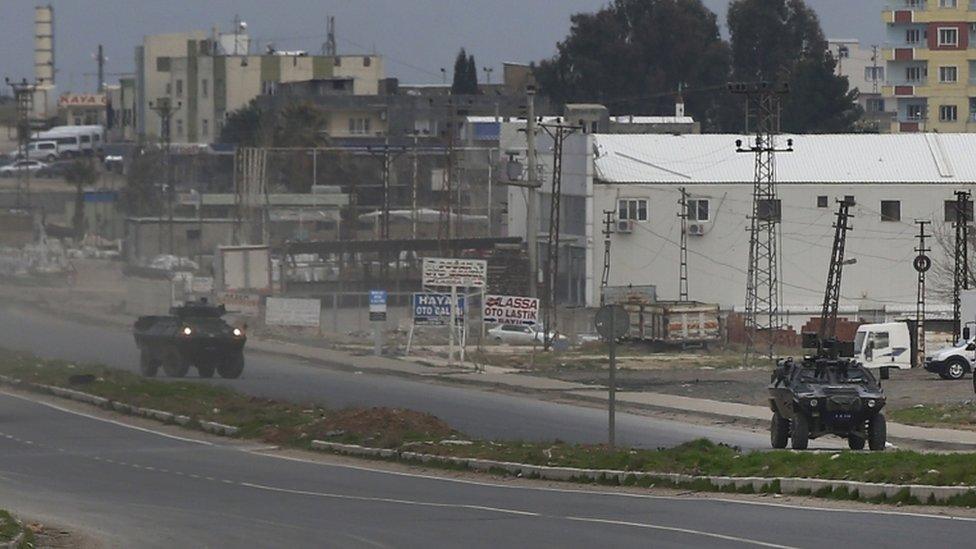Turkey issues new threats to Kurdish forces in Syria
- Published

Turkey has spelled out what it will not allow the Kurdish forces to do
Turkey has promised the "harshest reaction" if Kurdish forces try to take the key town of Azaz in northern Syria.
Over the weekend Turkey shelled the Kurdish YPG militia as it made advances in the area.
Syria said the Turkish shelling was a violation of its sovereignty and called on the UN to act.
Turkey views the YPG militia in Syria as allied to the outlawed PKK, which has carried out a decades-long campaign for autonomy in Turkey.
Syria: The story of the conflict
Turkey v Islamic State v the Kurds: What's going on?
Turkish Prime Minister Ahmet Davutoglu told reporters on his plane as he headed to Ukraine that the weekend shelling had managed to force the YPG from Azaz.
"If they approach again, they will see the harshest reaction. We will not allow Azaz to fall," he said.
Mr Davutoglu also pledged to make the Syrian Menagh air base "unusable" if the militia did not withdraw from the area, and that the YPG would not be allowed to move east of its Afrin region or west of the Euphrates.
The horrifying statistics that define Syria
The Kurds have been capturing areas from Syrian rebel forces who are also fighting President Bashar al-Assad.
The YPG has rejected Turkey's demand to leave areas it has seized, saying Islamist rebels would return if it left.
The BBC's Mark Lowen in Istanbul says Turkey's action against the Kurds has opened a new front in Syria - the stage for several proxy wars already.
UN letters
Turkey had earlier denied reports that some of its soldiers had entered Syria, the state-run Anadolu news agency said.
Defence Minister Ismet Yilmaz also told a parliamentary commission it was not considering deploying troops there.

In his comments to the parliamentary commission, Mr Yilmaz also denied that Saudi Arabian aircraft had arrived in Turkey to help with operations against so-called Islamic State (IS), but said a decision had been taken for Saudi Arabia to send four F-16s.
The Syrian government had earlier said in letters, external to the UN Secretary General and the Security Council's chairman that Turkey had allowed about 100 gunmen - believed to be either "Turkish soldiers or Turkish mercenaries" - to cross into Syria.
Syria believes the gunmen are trying to supply insurgents fighting in Damascus.
The letters to the UN said that "Turkish artillery shelling of Syrian territory constitutes direct support to the armed terrorist organisations".
"[Syria] will maintain its legitimate right to respond to the Turkish crimes and attacks and to claim compensation for the damage caused," they said.
The United States and others back the Kurdish militia in Syria, the YPG, in its fight against so-called Islamic State.
Last Thursday in Munich, world leaders pledged to work towards a cessation of hostilities in Syria within a week,
But Russia argues that the "cessation" does not apply to its air strikes, which have tilted the balance of the war in favour of the Syrian government.
Russia has been carrying out air strikes since September in support of Mr Assad and against what it terms "terrorists".
Almost five years of civil war in Syria have led to the deaths of more than 250,000 people. More than 11 million people have been displaced.